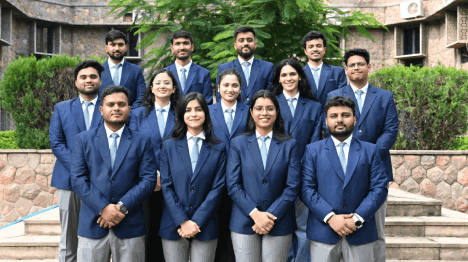- About Us
-
Academics
Schools
Programs
General Information
-
Faculty
The faculty members and researchers working at IIHMR University come from varied backgrounds including, but not limited to medicine, public health, management, economics, statistics, demography, human geography, social and behavioral sciences, rural development and pharmaceuticals.
-
Admissions
- Research
Publications & Journal
- Executive Education
Executive Programmes
- Online Certification Courses
ONLINE CERTIFICATION Courses
- Training
- Placements
- Contact
- Pradanya
- Blog
- Fee Payment
- NAAC
- IQAC
- NIRF
-
About Us
- About IIHMR University
- Board of Management
- Academic Council
- Board of Studies
- Research Board
- Institutional Review Board
- Finance & Audit Committee
- Departmental Research Committee
- Chairperson's Message
- President's Message
- IIHMR University Act
- Infrastructure
- Collaboration
- Ranking
- Board of Studies (School of Digital Health)
- Awards & Accolades
-
Academics
- Institute of Health Management Research
- School of Pharmaceutical Management
- ML Mehta School of Development Studies
- School of Digital Health
- SD Gupta School of Public Health
- MBA (Hospital and Health Management)
- MBA (Pharmaceutical Management)
- MBA (Development Management)
- MBA (Healthcare Analytics)
- Master of Public Health
- Student Manual – Cohort 9 (2021-2023)
- Master of Public Health (Offered by Johns Hopkins Bloomberg School of Public Health, USA in cooperation with IIHMR University, Jaipur, India)
- Ph. D.
- MBA CSR & ESG Management (Executive)
- MBA Sustainable Business Management (Executive)
- Common Information for all the Programs
- Academic Calendar
- Student Handbook 2020-21
- Committees
- Policies
- Annual Exam Calendar
- Library
- Faculty
- Officers of University
- Dean of Institute of Health Management Research
- Dean of School of Pharmaceutical Management
- Dean of School of Development Studies
- Dean of SD Gupta School of Public Health
- Dean of School of Digital Health
- School of Digital Health
- Faculty List A to Z
- Faculty List Designation Wise
- Faculty List School Wise
- Admissions
- Research
- Executive Education
- Training
- Placements
- Alumni
- Events
- Job Openings
- Contact
- Research
Developing Project Baseline for Rural Sanitation and Ganga Rejuvenation in Jharkhand
Agency : UNDP
The project “Implementation of Rural Sanitation Initiatives for Ganga Rejuvenation in 78 villages across 6 blocks of Sahibganj District of Jharkhand” is a baseline study supported by UNDP. It explains current level of key sector performance that will ensure sustainability of intervention across 78 project villages supported by UNDP. These identified levels will help to set the bench mark for measuring changes regarding a new program targeted to improve these basic services and sector performances.
The project’s primary objective of Ganga Rejuvenation project ‘Namami Gange’ is to improve the water quality and rejuvenation of the Ganga River through supporting ongoing efforts of the Ministry of Water Resources, River Development and Ganga Rejuvenation and the Government of Jharkhand to facilitate a shift from unsustainable to sustainable sanitation practices. Sustainability of project initiatives will be ensured through an integrated livelihoods approach.
The aim will be to improve the health and quality of life of around 45,000 households located in 78 villages of the Ganga river basin in Jharkhand through improved sanitation practices, while also improving the quality of waste water and storm water runoff flowing from the 78 villages into the river Ganga. The project presents the findings of house to house data collected from a total of 5360 houses sampled from 78 villages across six blocks namely Borio, Sahibganj, Talijhari, Rajmahal, Udhwa and Barharwa of Sahibganj district of Jharkhand. The quantitative data was further reinforced by different qualitative information which was collected through Focus Group Discussion (FGD), Key Informant Interview, PRA, and other techniques. An assessment of demand and supply was made to see - the capacity of sector (Water, Sanitation and waste management) to self-generate large scale demand and capability of the actor’s NGOs, CBOs, SHG, VHSC, local groups etc. to meet it.
The major findings and condition of the project points towards low priority of water, sanitation hygiene, solid-liquid waste management, and sustainable livelihood to achieve the objectives of the Ganga rejuvenation project both in general population and policy makers. It will also add to the global commitment in terms of supporting the country’s effort to reach SDG for sanitation and hygiene that is currently far behind.



